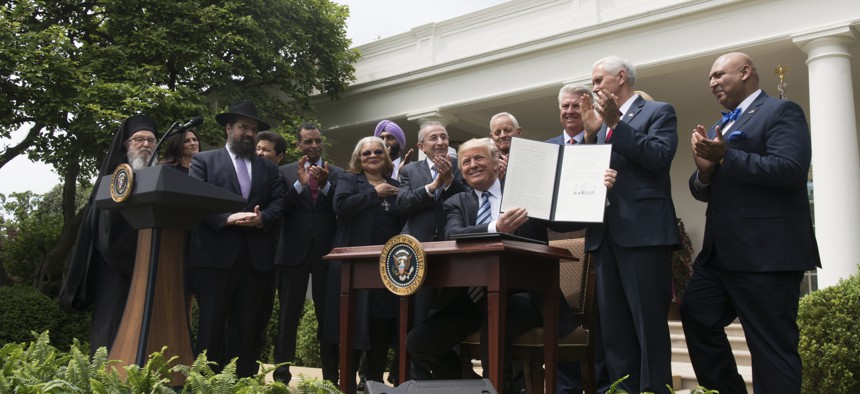Now It's Liberal States Clashing With the Federal Government Over Religious Freedom

Donald Trump is applauded by gathered religious leaders in May. White House file photo

Connecting state and local government leaders
California, Pennsylvania, and others have sued over new policies on contraceptive coverage.
The battle over birth control and the Affordable Care Act wages on. A handful of liberal state attorneys general have sued the federal government over its new contraception-coverage rules, which exempt employers with religious or moral objections from including birth control in their employee health-insurance plans.
For years, religious businesses and nonprofits pounded the government with lawsuits over Obamacare’s birth-control-coverage requirement, until a Supreme Court decision, and, later, the Trump administration, essentially resolved their objections. Now, it’s liberal lawyers who are stoking the culture war. The same players have switched sides and are headed back to the courts, which seem doomed to keep adjudicating disagreements between ever-revolving political majorities.
The lawsuits are headed up by predictable players. Pennsylvania and California headline separate complaints, with Delaware, Maryland, New York, and Virginia joining the latter. California Attorney General Xavier Becerra, a former Democratic U.S. representative, has repeatedly taken up the role of liberal culture-warrior under Trump; last spring, for example, he filed felony charges against the pro-life activists who secretly filmed Planned Parenthood officials discussing the organization’s distribution of fetal tissue. Pennsylvania recently joined other blue states in challenging the Trump administration’s intention to end DACA, the Obama-era program that protected some undocumented young people from deportation.
These new challenges on birth control argue that the Trump administration is illegally limiting women’s access to contraceptives, which will place a cost burden on states that have to cover those services in place of employers. California’s complaint claims that 25 employers in the state, with a combined 54,879 employees, will make use of the accommodation, meaning that “an unknown but substantial number of California women” will turn to publicly funded clinics or state programs for their birth control. Other numbers cited in the suits are similarly small and fuzzy: five potential employers seeking the exemption in Maryland, at least 10 in Virginia, “several” in New York.
Between the two of them, the new lawsuits throw out a kitchen-sink’s worth of legal objections to the new Trump administration rules: violations of the Administrative Procedure Act, which sets requirements around how new agency rules are promulgated; Title VII of the Civil Rights Act and the Pregnancy Discrimination Act, which both bar discrimination based on sex; and the equal-protection, due-process, and establishment clauses in the Constitution. They claim the new rules were made without notifying the public and offering opportunities for comments; and that the introduction of a “moral” objection to birth control, rather than a specifically religious one, is impermissibly broad. Both seek nationwide injunctions on the new Trump administration rules.
In response, religious groups are gearing up to go back to court, even though many of them had considered their cases resolved. Becket, a D.C. law firm focused on religious freedom, has promised to file a brief on behalf of the Little Sisters of the Poor, a group of nuns who care for the elderly at homes around the country. Mark Rienzi, one of the group’s lawyers, was disdainful toward the new lawsuits in a press call. He questioned why new lawsuits had been filed in new courts by players who weren’t involved in the previous birth-control litigation. “These are political grandstanding lawsuits,” he said. “They are not winners.”
As Congress keeps up its nonstop political standoffs, and the country sinks further into sharp division over the Trump administration, the courts may be the primary arena where policymaking actually happens. In this case, litigation has ping-ponged back and forth between the two sides as the federal government shifted its stance. As the birth-control issue comes back around for another spin in the headlines, cultural roles have shifted, too: It’s no longer the religious groups fighting a culture war against what they see as a tyrannical majority. It’s liberals.




